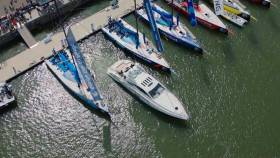Displaying items by tag: Selfdocking
Yacht Docking Made Easy By New Volvo Autopilot Tech
Volvo has an ingenious solution to one of the more stressful manoeuvres in sailing with the unveiling of its advanced self-docking technology.
In a live demonstration at the Volvo Ocean Race stopover in Gothenburg, a 68ft yacht fitted with Volvo Penta’s self-docking solution positioned itself into the tightest of spaces between two of the VOR 65 racing yachts - Turn the Tide on Plastic and Gothenburg In-Port Race winners Vestas 11th Hour Racing.
“Docking is one of the most challenging boat handling maneuvers – getting it wrong can be embarrassing, expensive and precarious,” said Björn Ingemanson, president of Volvo Penta.
“Our IPS [integrated propulsion system] has already taken great strides in making docking easier, and this new self-docking feature takes that process one important stage further.
“Its sensors and onboard computers react in milliseconds to changing wind and sea conditions, constantly making micro adjustments in power and steering angle of the IPS drive to keep the boat on its intended course into a safe berth.
“If necessary, the docking process can be paused, and the system will hold the boat stationary in the water. Even in changing sea conditions it can make the sea appear to stand still.”
The Volvo Group has been carrying out research into autonomous vehicles and the transport systems of the future for several years. The group has produced a number of examples of self-driving concept vehicles for use in restricted areas, such as mines and ports.
Safety is a primary factor in the ongoing development of such features and, as with similar ‘self-parking’ technology in the automotive world, Volvo Penta’s docking system is not designed to be fully autonomous.
While the system will also feature surround sensors that provide anti-collision alert and avoidance, the captain needs to remain at the helm during the docking process, ready to intervene if necessary.





























































